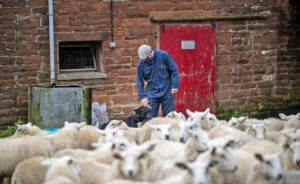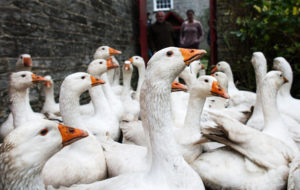We’re still eating a glut of chocolate from the Easter egg-hunt. But we also have a glut of real eggs: over two dozen, from our six back-garden chickens. As my house struggles with an egg surfeit, though, Britain’s shops have the opposite problem. This week, it was reported that many of the hens now supplying British shops are Italian. This is, producers claim, because supermarket pricing has forced many British egg farmers out of business. After a few years of selling your eggs at a loss, what is a farmer to do?
One of the UK’s poultry producers’ associations reported last autumn that between bird flu and persistently low margins, up to a third of its members either reduced production or closed down altogether. One former egg farm near me now rents storage units; another has been on the market for months, unable to find a buyer. As a result, there aren’t enough eggs to stock the shelves — and supermarkets are importing them from Italy. “So what?” you might ask. This is the market at work. But around this time three years ago, egg politics looked for a moment as though they might be on a different course.
Covid lockdowns scrambled many of the food supply chains we’d grown accustomed to — and as the country reeled, it seemed briefly as though more local networks might begin to re-emerge. (This was the point we first got our birds, albeit less with profit in mind than our own kitchen.) On my street, neighbours with back-garden poultry did a roaring trade.
Early 2020 brought a wider sense, too, that Covid might signal the end for free-trade absolutism more generally, and prompt a return to more bounded and local networks. But three years on, although my street still has several poultry-keepers, most have reverted to buying eggs from the shops. The turn away from free trade, if the Italian egg suppliers are anything to go by, has yet to occur.
Why, then, do we seem unable to imagine any other way of doing things? This seemingly inexorable drift back to the impersonal market epitomises Britain’s approach to food. This system, which we embraced in earnest nearly two centuries ago, maps a belief in the impersonal logic of “the market” onto a terrain whose most important attributes are simply not visible to market logic. And egg politics shows, in microcosm, just how poorly this ideology meshes with food production — to the extent that it now threatens our capacity to produce food at all.
Our trajectory toward the current situation was set out by Karl Polanyi, in the influential 1944 book, The Great Transformation. Humans, Polanyi argues, have always bought, sold, and exchanged things. But for the most part, across time and cultures, the market has been ordered to the needs of social institutions, and regulated accordingly. What’s unique about the modern world, he suggests, is that it works the other way round: our social institutions are ordered to the market.
For Polanyi, it was the enclosure of the commons that set England on this trajectory, by displacing England’s subsistence peasants, and creating the industrial proletariat, who were obliged to work for a wage. Perhaps the last nail in the coffin for that older, landowning order was the 1846 repeal of the Corn Laws: tariffs that aimed to protect domestic grain prices from the influence of cheaper foreign imports, and were vigorously opposed by the mercantile class and industrial proletariat.
It was, in effect, a contest between Britain’s food producers and an emerging population of food consumers. And in 1846, the food producers lost their protection from competition. The change accelerated Britain’s shift from a farming-first to an industrial economy, and set agriculture — once the largest employer in England — on the trajectory it’s followed ever since: dwindling opportunities for youth, relentless demands for efficiency, and with these a bitter tension between land stewardship, and market-driven pressure to lower standards. The historian Robert Ensor writes that after repeal, “the only chance for any young or enterprising person on the countryside was to get out of it”. Many smaller farmers gave up, and emigrated to America.
As populations urbanised, this also pushed Britons to abandon domestic poultry-keeping — or rather, to centralise it. Today, most egg farming (where it survives at all) is highly industrialised, with 48% of British birds in battery cages. Despite more recent regulations banning the cruellest intensive farming practices, bird welfare often suffers. And their waste, though an excellent nutrient for our domestic veg beds, is a major source of river pollution at scale.
Perhaps the gains in efficiency warrant the loss of chicken-keeping culture. But chicken centralisation also illustrates how, when market pressures collide with food production, it’s not so much that costs are driven down. Rather, they’re externalised into areas that don’t appear on the balance sheet, such as animal cruelty, river pollution, distressed producers — or, more subtly, disappearing cultures.
We’re middle-class chicken hobbyists, not farmers, but even amateur poultry-keeping has left me wondering what else is lost in cultural terms when chickens are centralised, from realism about animal behaviour, to poultry-based metaphors — or seasonal rituals. Absent modern, artificial housing conditions, many hens stop laying over the winter. If your birds are free-range, when they start again in the spring, you have to figure out where they’re hiding their eggs. When I learned this, it left me wondering whether this insight survives for most modern families only in the other egg glut we’re eating our way through: the chocolate one. Modern chocolate was, after all, invented the year after the Corn Laws were repealed. So Britain’s urbanisation began in earnest just as chocolate became a mass-market treat. Did a trace of the older form of “spring egg hunt” — for real eggs — urbanise, too, in chocolate form, among now-henless households?
The nineteenth-century Tories were ambivalent about such losses: the Corn Law debate split the Tory Party down the middle, and eventually forced Robert Peel’s resignation as Prime Minister. But despite their residual association in the public mind with the interests of landowners, today’s Tory Party seems closer in spirit to the old Whigs: mercantilist to the core, and deeply reluctant to look too closely at how well “markets” manage the complex mesh of social, environmental and economic issues bound up in domestic food production.
When, for example, Johnson struck a “free trade deal” with Australia around two years ago, it was hailed as a benefit of Brexit. At the time, the National Farmers’ Union warned that the proposed deal would be disastrous for British farmers; Johnson shrugged it off with a merrily Whiggish nod to market ideology, declaring: “This is a country that grew successful and prosperous on free trade, on exporting around the world.”
Last year, British farmers warned again that, applied to farming, these free-market policies are “sleepwalking” Britain into a food crisis. In January, shop shelves across the country stood empty. The government shrugged, this time blaming supermarkets for “market failure”. More recently, food tsar Henry Dimbleby quit his post, condemning ministers’s “ultra-free-market ideology” as a threat to Britain’s food security.
But the ideology seems as tenacious as ever, and our leaders as convinced at ever that where the dictates of the market require that something be dissolved — even if that turns out to be Britain’s capacity to produce eggs at all — then it will be dissolved. We don’t need poultry producers in Britain. The market will provide: we’ll just import eggs.
But this is premised on a belief that nothing can stand in the way of international trade, now or in the future. And even leaving aside energy prices, just based on news headlines over the last 20 years, this strikes me as — to put it mildly — a risky bet. What if we grind domestic food security to nothing in the name of the “free market”, only for the wheels to come off global trade again?
And yet nor am I sure that this is just a matter of ideology-blinded mercantilist leaders. For all proposed solutions to food security — whether free-market ones from the Right, or regulatory or veganism-based ones from the Left — share the same implicit certainty that whatever the solution is, it will still involve centralisation. And yet we could surely make a dent in the nested (sorry) poultry problems of food security, pricing, pollution, welfare, and carbon-intensive supply chains — not to mention improve domestic food waste management — by going the opposite way, toward chicken decentralisation.
Yes, some people live in apartments. But 87% of British homes have a back garden. And regulations on intensive poultry farming permit an insane density of birds — 17 hens per square metre — meaning even a tiny back garden could easily keep a few hens in many times this space, while enabling the recycling of kitchen scraps and supplying the garden with high-quality fertiliser.
So why aren’t we doing this? I don’t think it’s just that Tories are wicked mercantilists, or that the farmers are almost gone already. The only explanation I can see is simple, and dispiriting: that however excited some got in 2020 about re-localising and de-marketising food production, the vast majority of people just don’t want to.
The fault, in truth, lies with all of us: for market “efficiency” and “convenience” isn’t just about price and choice. It’s also about lack of obligation. As I’ve learned when buying (and, occasionally, selling) eggs among neighbours, the moment you make trade more local — which is to say, more personal — you swiftly become caught in additional layers of obligation, whether to the birds that depend on you for food and safety, or to the neighbours whose subsistence is now (in however tiny a way) more bound up in yours.
And while communitarians often idealise such networks, we’ve grown accustomed to being able to buy eggs without this layer of complexity. No one who views taking the neighbour’s bin round as a huge favour will be keen on re-creating this complexity unless they absolutely have to. Most are still more than happy to look away from the uncounted welfare, ecological and food-security costs of this freedom from obligation. And I suspect it’s this, more than anything, that explains our Titanic-like drift toward the iceberg of food supply disaster.
Changing course would not just mean kicking out the Tories, or fiddling with regulations, embracing synthetic foods, or even re-building forgotten practices in domestic food production. It would mean re-evaluating every basic assumption about how we relate to one another, and why. The food crisis will have to get a great deal more severe — and fresh eggs a great deal more expensive than mass-produced chocolate ones — before many are willing to do that.
Disclaimer
Some of the posts we share are controversial and we do not necessarily agree with them in the whole extend. Sometimes we agree with the content or part of it but we do not agree with the narration or language. Nevertheless we find them somehow interesting, valuable and/or informative or we share them, because we strongly believe in freedom of speech, free press and journalism. We strongly encourage you to have a critical approach to all the content, do your own research and analysis to build your own opinion.
We would be glad to have your feedback.
Source: UnHerd Read the original article here: https://unherd.com/




